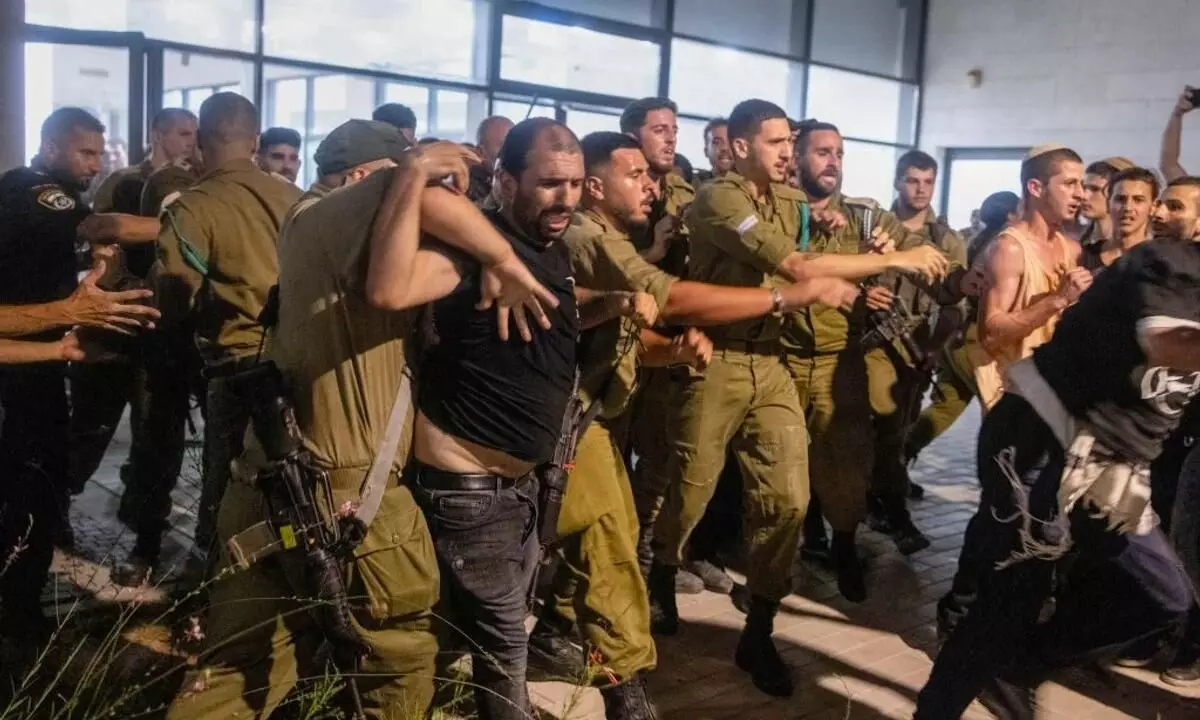
Far-Right Israeli lawmaker justifies inserting stick into Hamas prisoner’s rectum
text_fieldsAmid UN reports of Israel’s abuse of Palestinians in prison, the fissure in Israeli society over reports that a Palestinian prisoner was subjected to sodomy came to light when Israeli activists called the act a heinous crime. However, right-wing Israeli lawmakers reacted by asserting that anything is legitimate if the detainee is a Hamas militant.
On July 29, Israeli military police detained nine reservists at the Sde Teiman military base in the Negev desert. The detentions were part of an investigation into accusations of substantial sexual abuse of a Palestinian prisoner.
Reports indicate that the prisoner, allegedly a high-ranking Hamas militant, suffered severe injuries, including a ruptured bowel and damage to his anus. The investigation into these allegations is being conducted amid growing concerns about human rights violations at Israeli detention facilities, which have been the subject of multiple investigations by international media outlets.
The situation intensified when a large group of protesters, including several Knesset members from far-right factions, broke into the Sde Teiman base. The protesters, numbering around 200, expressed their outrage over the detentions, claiming that any actions taken against Hamas militants were justified.
The confrontation escalated when some soldiers reportedly used pepper spray against military police trying to enforce the detentions. The protesters also moved to another base, Beit Lid, where the detained soldiers had been transferred.
During a Monday meeting, a member of Prime Minister Benjamin Netanyahu’s Likud party defended the rape and abuse of Palestinian prisoners, arguing that any actions against “terrorists” in custody are justified. This defence came amid intense questioning from colleagues, with the lawmaker asserting that extreme measures are acceptable if the detainee is considered a Hamas militant.
Lawmaker Hanoch Milwidsky was asked as he defended the alleged abuse whether it was legitimate, “to insert a stick into a person’s rectum?”
“Yes!” he shouted in reply to his fellow parliamentarian. “If he is a Nukhba [Hamas militant], everything is legitimate to do! Everything!”
The Israeli Defense Forces (IDF) condemned the storming of the bases, citing concerns that it distracted from ongoing military operations against Hezbollah in Lebanon. Prime Minister Benjamin Netanyahu strongly criticized the base infiltrations, while Defense Minister Yoav Gallant and other officials demanded a thorough investigation into the actions of far-right leaders who participated in the protests.
The response from the ruling coalition was mixed, with some members supporting the soldiers' actions and others calling for accountability and adherence to the law.
The IDF has stated that the soldiers' detentions and the subsequent protests compromised Israel’s security, leading to a significant mobilization of additional troops and resources to manage the situation. The Israeli government has faced criticism from both domestic and international quarters, with opposition leaders accusing the far-right factions of attempting a coup and undermining state authority. Meanwhile, far-right politicians have defended the soldiers and criticized the military and judicial systems for prosecuting them.
The unrest has drawn attention to the broader issues surrounding the treatment of Palestinian prisoners and the role of the far-right in Israeli politics. Reports and investigations into the conditions at the Sde Teiman base and other military detention centres have highlighted serious concerns about the treatment of detainees, raising questions about the ethics and legality of the actions taken by Israeli forces.
The political fallout from these events has been substantial. The protests have underscored the deep divisions within Israeli society, particularly between the far-right and more moderate elements of the government and military.
The International Criminal Court (ICC) is considering a request to investigate Israeli leaders for war crimes, adding further pressure on the Israeli government to address allegations of abuse and maintain international legitimacy.
In the wake of these events, Israeli commentators have drawn comparisons to historical moments of crisis, such as the Altalena incident of 1948, suggesting that the conflict over the treatment of Palestinian prisoners represents a fundamental challenge to the authority of the state and its institutions.











